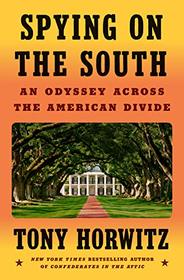Search -
Spying on the South: An Odyssey Across the American Divide
Spying on the South An Odyssey Across the American Divide
Author:
Beloved best-selling author Tony Horwitz retraces Frederick Law Olmsted's epic journey across the American South in the 1850s, as he too searches for common ground in a dangerously riven nation. — On the eve of the Civil War, an up-and-coming newspaper, the New York Times, sent a young travel writer to explore the South, which was alien territory... more »
Author:
Beloved best-selling author Tony Horwitz retraces Frederick Law Olmsted's epic journey across the American South in the 1850s, as he too searches for common ground in a dangerously riven nation. — On the eve of the Civil War, an up-and-coming newspaper, the New York Times, sent a young travel writer to explore the South, which was alien territory... more »
ISBN-13: 9781101980286
ISBN-10: 1101980281
Publication Date: 5/14/2019
Pages: 496
Rating: 2
ISBN-10: 1101980281
Publication Date: 5/14/2019
Pages: 496
Rating: 2
4 stars, based on 2 ratings
Publisher: Penguin Press
Book Type: Hardcover
Other Versions: Paperback, Audio CD
Members Wishing: 13
Reviews: Amazon | Write a Review
Book Type: Hardcover
Other Versions: Paperback, Audio CD
Members Wishing: 13
Reviews: Amazon | Write a Review
Genres:
- History >> Americas >> United States
- Travel >> United States >> Regions >> South >> General
- Nonfiction >> Social Sciences >> Discrimination & Racism




